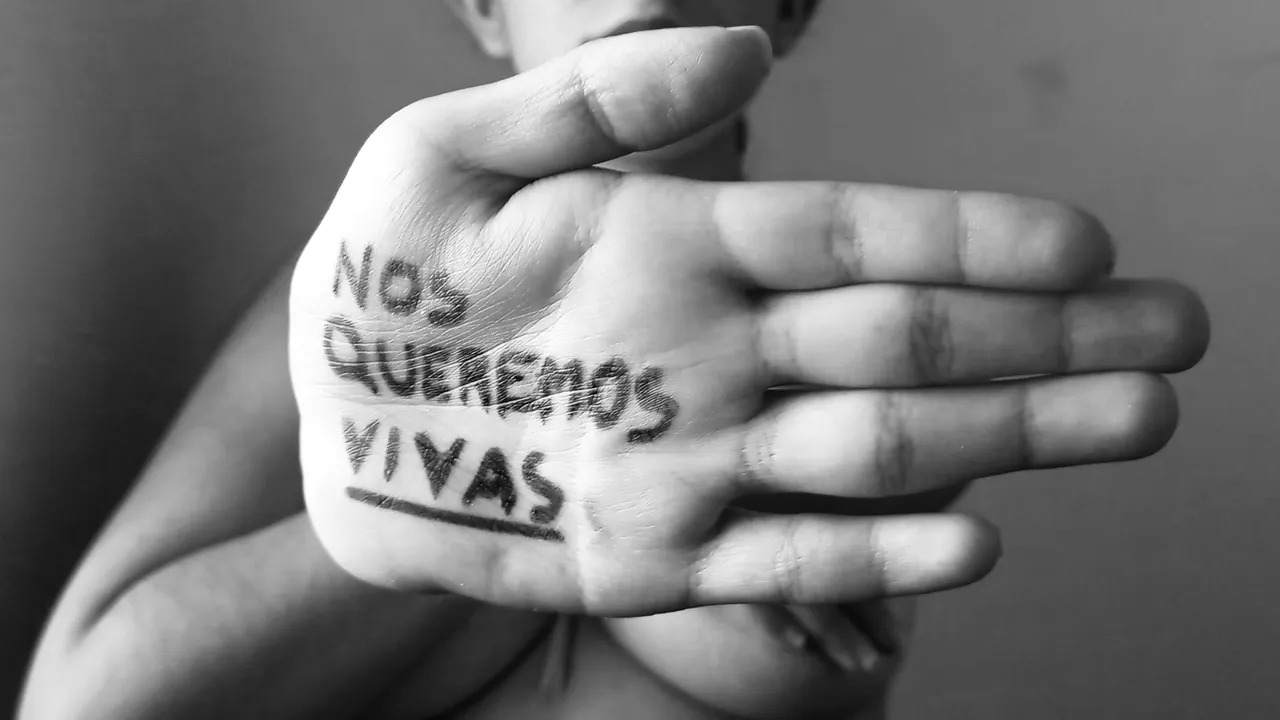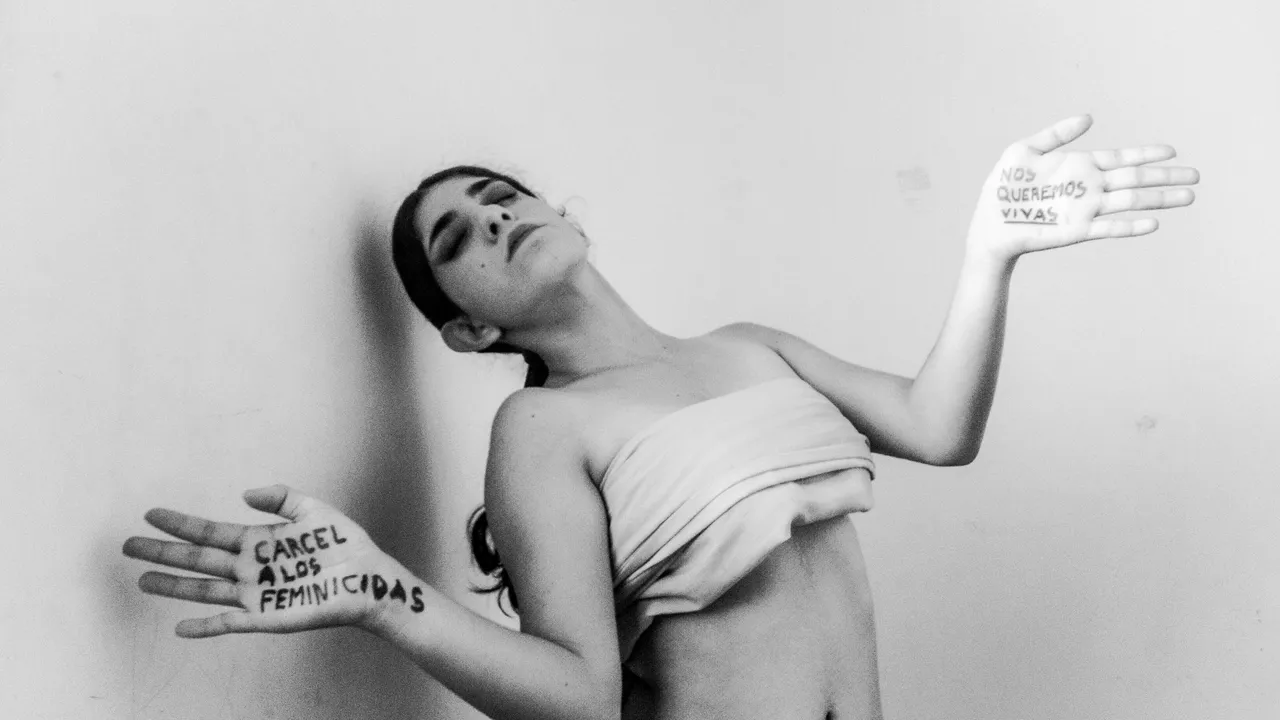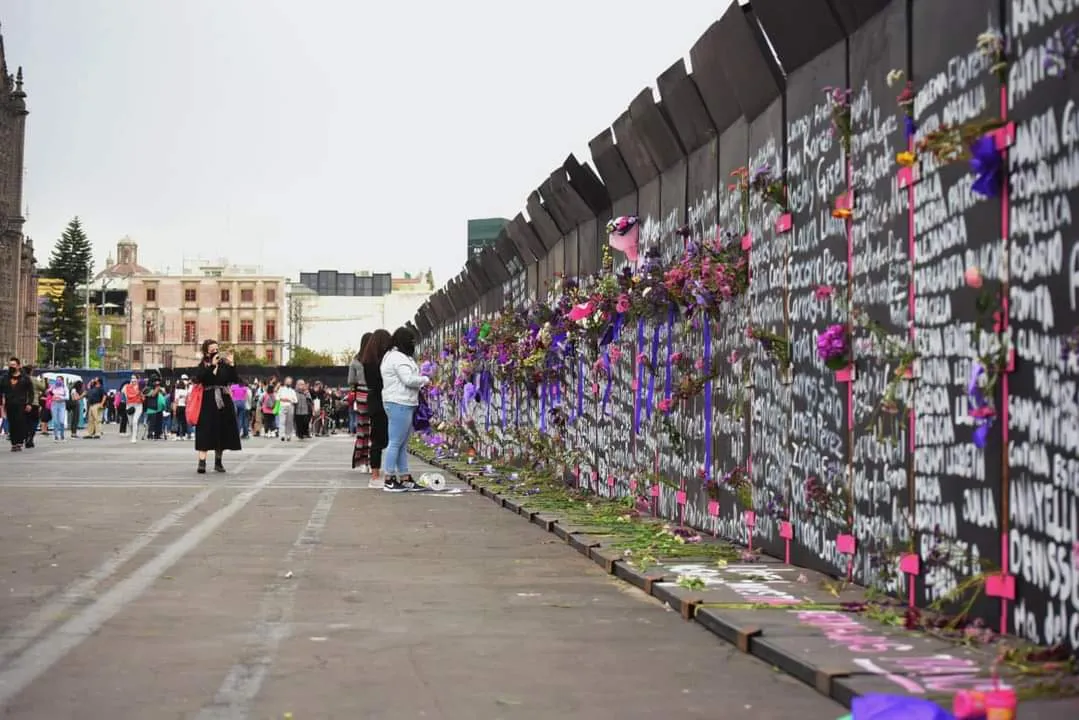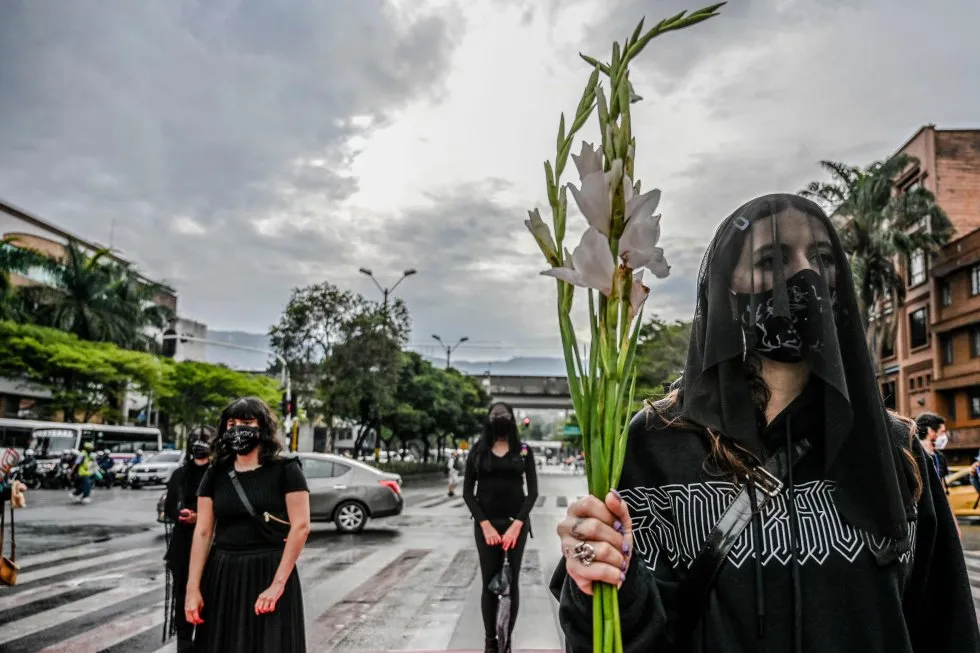
Photo by @revivemyheart.
Hace ocho días, muchas feministas estaban saliendo a las calles, o conectando sus celulares para compartir mensajes de resistencia, y así conmemorar el día de la mujer. Estaban rayando paredes, monumentos, saliendo desnudas, gritando, atascando las calles y peleando con la policía en plena pandemia. ¿Por qué hacen esto? ¿Realmente son las formas? ¿A caso creen que haciendo protesta van a borrar años de historia?
Eight days ago, many feminists were taking to the streets, or connecting their cell phones to share messages of resistance, to commemorate Women's Day. They were scratching walls, monuments, going out naked, screaming, clogging the streets and fighting with the police in the middle of a pandemic. Why are they doing this? Is this really the way? Do they think that by protesting they are going to erase years of history?
Las protestas, para las personas civiles, muchas veces es un extremo. Pero siempre ha existido esta organización política de reclamo. Ahora mismo, nos parece una exageración porque ya es el 2021, ya la humanidad a evolucionado como para poder respetar los derechos de todos. ¿No es así? Tenemos leyes para respetar las razas, a las mujeres, a la comunidad LGBT, a los discapacitados.
Protests, for civilians, are often an extreme. But there has always been this political organization of protest. Right now, it seems to us an exaggeration because it is already 2021, humanity has already evolved to be able to respect the rights of all. Isn't it? We have laws to respect races, women, the LGBT community and the disabled.
Bien pues, creo que pensar así es no querer mirar más allá de tus ojos. Hasta hace menos de un año, muchos estadounidenses salieron a marchar en plena pandemia, para respetar el derecho a la vida, sin discriminación por color de piel. El hastag de esta lucha fue #blacklivesmatter, a pesar de que muchos negros viven y trabajan "normalmente"... ¿qué es vivir normalmente para ellos? Muchos sabrán de qué hablo, no tengo que explicar el caso.
Well, I think that thinking like that is not wanting to look beyond your own eyes. Until less than a year ago, many Americans went out to march in the midst of a pandemic, to respect the right to life, without discrimination based on skin color. The hastag for this fight was #blacklivesmatter, despite the fact that many blacks live and work "normally"... what is living normally for them? Many will know what I'm talking about, I don't have to explain the case.
Seguimos estando en peligro, hay algunas leyes que no nos protegen del todo. Y por eso, las feministas salieron, se manifestaron y conmemoraron el día de la mujer. No son unas exageradas, entiendo por qué luchan, porque yo también soy mujer y tengo miedo de salir a la calle sola, porque sé que hombres ahí afuera no me respetaran... Esto lo sé desde los nueve años...¿No creen que eso es demasiado?
We are still at risk, there are some laws that don't fully protect us. And that's why feminists came out, demonstrated and commemorated Women's Day. They are not exaggerating, I understand what they are fighting for, because I am also a woman and I am afraid to go out on the street alone, because I know that men out there will not respect me.... I've known this since I was nine years old... Don't you think that's too much?
Así que, como no solo el ocho de marzo se tiene que hablar de derechos humanos, hoy lo voy a hacer.
So, since it's not only on March 8th that we have to talk about human rights, today I'm going to do it.
Puntos que tocaré // Points I will touch on::
- Mi propia lucha // My own struggle.
- ¿Qué pasó en Chile? // What happened in Chile?
- ¿Qué pasó en México? // What happened in Mexico?
- ¿Qué pasó en el resto del mundo? // What happened in the rest of the world?

Mi propia lucha | My own struggle.

Photo by @revivemyheart.
Written by me on March 8 at 8:00 a.m:
Escrito por mí el ocho de marzo a las ocho de la mañana:
El ocho de marzo no se celebra, se lucha, porque nos lo hicieron, nos lo siguen haciendo, y para… que ya no lo sigan haciendo. ¿Hacer qué? Matarnos, violarnos, acosarnos, sexualizarnos, y reducirnos a objetos, incubadoras y sacos de boxeo. Por no reconocernos como seres humanas.
The eighth of March is not celebrated, it is fought, because they did it to us, they continue to do it to us, and to... stop doing it. Do what? Kill us, rape us, harass us, sexualize us, and reduce us to objects, incubators and punching bags. For not recognizing us as human beings.
¡Reconozcanos como seres humanos!
Recognize us as human beings!
De mujer a mujer, te felicito. ¿Por qué? Porque eres tan fuerte como para experimentar este cuerpo y este rol, que tantas injusticias traen. Te felicito porque, la mayoría de las mujeres menstrúan y así, aunque sea un poco, se reconocen así mismas y a su cuerpo. Te felicito porque la mayoría de las mujeres, tienen un útero en donde algunas han dado vida desde su cuerpo, padeciendo violencia dentro y fuera de él. Te felicito porque al experimentar el rol impuesto, logras ver más allá, logras ver el gran problema en el que estamos metidas. Te felicito porque tienes la chispa de luchar, porque luchas, porque a pesar de todos los obstáculos que nos ponen, los esquivas o vives en ellos, para luego ser tan fuerte como para salir.
As one woman to another, I congratulate you. Why? Because you are strong enough to experience this body and this role, which bring so many injustices. I congratulate you because most women menstruate and thus, even a little, recognize themselves and their bodies. I congratulate you because most women have a uterus where some have given life from their bodies, suffering violence inside and outside of it. I congratulate you because when you experience the imposed role, you manage to see beyond, you manage to see the big problem in which we are involved. I congratulate you because you have the spark to fight, because you fight, because in spite of all the obstacles they put in our way, you dodge them or live in them, and then you are strong enough to get out.
Te felicito mujer, y también lo siento. Lo siento por las muertes y por los nombres femeninos que tenemos que escribir en paredes y lapidas. Lo siento por las violaciones, que desde dentro de casa se encuentran y porque todos los días tienes que vivir con tu abusador. Lo siento por el acoso sexual frecuente que te encuentras a la esquina de tu casa. Lo siento por la obligación de complacer a tu esposo, porque hay todo un contexto detrás de eso. Lo siento por la obligación de casarte desde pequeña. Lo siento porque nos hicieron creer que tenemos que casarnos con un hombre rico para vivir. Lo siento porque el sistema hace que tengamos que casarnos con un hombre rico para vivir. Lo siento por las pocas oportunidades que nos daban antes y por las pocas oportunidades que nos dan ahora.
I congratulate you woman, and I am also sorry. I am sorry for the deaths and for the female names that we have to write on walls and gravestones. I am sorry for the rapes, that from inside the house are found and because every day you have to live with your abuser. I am sorry for the frequent sexual harassment that you encounter at the corner of your house. I am sorry for the obligation to please your husband, because there is a whole context behind it. I'm sorry for the obligation to marry as a child. I'm sorry because we were made to believe that we have to marry a rich man to live. I'm sorry because the system makes us have to marry a rich man to live. I am sorry for the few opportunities we were given before and for the few opportunities we are given now.
Aunque tal vez sean muchas las oportunidades, y el reconocimiento, no hay acción más allá de leyes insulsas, y las injusticias son entonces, más que las oportunidades.
While perhaps the opportunities are many, and the recognition, there is no action beyond bland laws, and the injustices are then, more than the opportunities.

Photo by @revivemyheart.

¿Qué pasó en Chile? | What happened in Chile?

Plaza Italia, Santiago de Chile. Source.
“No + Lesbo Odio” (Ecuador), “No + Femicidios” (Irarrázabal), “No + Impunidad” (Simón Bolivar), “Lucha Antirracista” (San Joaquín), “Aborto Libre y Legal” (Universidad Católica), entre otras, son algunas de las consignas que reemplazaron los nombres de las estaciones.
-Fuente.
El ocho de marzo salieron desde muchas ciudades, no solo en Santiago, a protestar. En Valparaiso, Chile hubo una gran confrontación, donde salieron policías anti-disturbios y Fuerzas Especiales de Carabineros a detenerlas.
Before the eighth of March arrived, feminists had already changed the names of Santiago subway stations, with demands for rights.
"No + Hate to lesbian" (Ecuador), "No + Femicides" (Irarrázabal), "No + Impunity" (Simón Bolivar), "Anti-racist Struggle" (San Joaquín), "Free and Legal Abortion" (Catholic University), among others, are some of the slogans that replaced the names of the stations.
-Source.
On March 8, people came out from many cities, not only in Santiago, to protest. In Valparaiso, Chile there was a big confrontation, where riot police and Carabineros Special Forces came out to stop them.
¿Qué pasó en México? | What happened in Mexico?
"Después de Brasil, México es el segundo país de América Latina con más crímenes de mujeres por razones de género, según datos de la Comisión Económica para América Latina y el Caribe." -Fuente.
El presidente de México, López Obrador, antes del ocho de marzo, mandó a colocar un muro metálico de tres (3) metros alrededor del Palacio Nacional, edificio que sirve de despacho y casa presidencial de México. Así mismo también protegió otros monumentos, como el edificio de Bellas Artes. Sin embargo, la concentración mayor fue en este palacio.
Para el sábado, feministas empezaron a pintar el muro, colocando los nombres de las mujeres muertas por feminicidios. En la parte superior se puede leer "victimas de feminicidios". También llevaron flores para decorar y conmemorar.
El lunes ocho de marzo, intentaron derribar el muro con martillos. El gobierno mandó a colocar policías mujeres alrededor del muro, y tanto policías como civiles, salieron heridas. La concentración fue de más de 20.000 personas, y las heridas fueron 81.
"After Brazil, Mexico is the second country in Latin America with the most gender-based crimes against women, according to data from the Economic Commission for Latin America and the Caribbean." -Source.
The president of Mexico, Lopez Obrador, before March 8, ordered the placement of a three (3) meter metal wall around the National Palace, the building that serves as the office and presidential house of Mexico. He also protected other monuments, such as the Bellas Artes building. However, the largest concentration was in this palace.
By Saturday, feminists began to paint the wall, placing the names of women killed by femicides. On the upper part you can read "victimas de feminicidios" (victims of feminicides). They also brought flowers to decorate and commemorate.
On Monday, March 8, they tried to tear down the wall with hammers. The government sent female police around the wall, and both police and civilians were injured. The rally was attended by more than 20,000 people, and 81 people were injured.

Ciudad de Mexico. Photo by Raaymundo Cardenas Vargas.

Ciudad de Guatemala, Mexico. Source.
¿Qué pasó en el resto del mundo? | What happened in the rest of the world?
Por ejemplo, esto sucedió en Madrid, España: "Un grupo de feministas han marchado por la calle Alcalá hasta Cibeles alrededor de las 18.00 horas mientras coreaban proclamas en favor de la mujer como 'Nos quieren sumisas, nos tienen combativas'[..]. Las concentradas se han colocado en varias filas con distancia de seguridad entre ellas, pero la formación se ha roto conforme llegaban a la Plaza de Cibeles, pero manteniendo el espacio." -Fuente.
Muchos gobiernos, incluyendo el de Venezuela, prohibieron salir a protestar por sanidad. Muchas quedaron en casa resistiendo de esta manera, otras, salieron tratando de ser fuertes ante la represión de sus propios países, tratando de hacerse oír, tratando de cumplir con las medidas de seguridad.
Feminists took security measures as this March 8th fell in the middle of the pandemic. They organized themselves to make resistance in social networks, to go out to balconies or windows to paste posters, also to go out to the street marching with masks and maintaining social distancing.
For example, this happened in Madrid, Spain: "A group of feminists have marched down Alcalá street to Cibeles at around 18.00 hours while chanting pro-women proclamations such as 'They want us submissive, they have us combative' [...]. The concentradas have been placed in several rows with safety distance between them, but the formation has been broken as they reached the Plaza de Cibeles, but maintaining the space." -Source.
Many governments, including Venezuela's, banned going out to protest for sanitation. Many stayed at home resisting in this way, others, went out trying to be strong in the face of repression from their own countries, trying to make themselves heard, trying to comply with security measures.


Photo by @revivemyheart.
¿Qué pasó el ocho de marzo? Salieron mis hermanas a pedir por nuestros derechos. Me siento segura porque ellas salen por mí y por las que ya no están, porque cada paso que dan, cada grito, cada baile, cada esfuerzo de mujer para llegar a puestos altos, es necesario para su fin; que nosotras y nuestras hijas vivamos en paz.
What happened on March 8? My sisters came out to ask for our rights. I feel safe because they came out for me and for those who are no longer here, because every step they take, every shout, every dance, every woman's effort to reach high positions, is necessary for their end; that we and our daughters may live in peace.
Finalmente, quiero invitaros a leer sobre feminismo, todas las opiniones que puedas encontrar, a favor y en contra. También a ver vídeos de Youtube sobre el tema, y leer libros. En este mundo creo que nos hace falta trabajar más el conocimiento y la empatía. Gracias por leerme.
Finally, I want to invite you to read about feminism, all the opinions you can find, for and against. Also to watch Youtube videos on the subject, and read books. In this world I think we need to work more on knowledge and empathy. Thanks for reading me.



